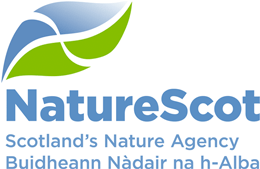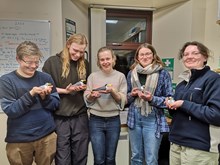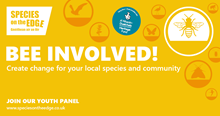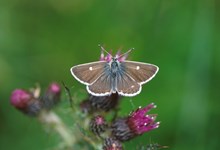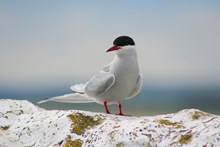02 October, 2023
Applications open for Species on the Edge Youth Panel
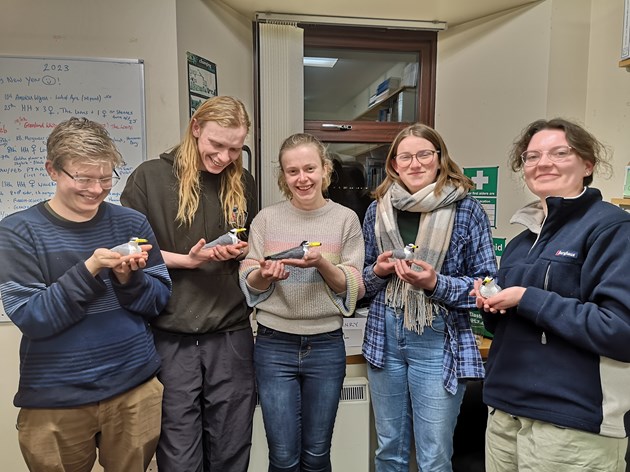
New conservation programme, Species on the Edge, is inviting young people from Scotland’s coasts and islands to apply for its Youth Panel.
Species on the Edge is a partnership programme of NatureScot and seven conservation charities, all dedicated to supporting vulnerable and threatened species found along Scotland’s coast and islands.
With over £6 million of funding, including £4 million from The National Lottery Heritage Fund, the Species on the Edge partner organisations are delivering a four-and-a-half year programme of conservation activity across seven project areas: the Outer Hebrides; the Inner Hebrides and Argyll; the North Coast; the East Coast; Orkney; Shetland; and the Solway Coast.
The programme is now recruiting 14 young people between the ages of 16 and 25 from across the seven Species on the Edge project areas for their Youth Panel.
The Species on the Edge Youth Panel will bring these young people together to discuss issues relating to the natural environment and their communities. Panellists will meet at least four times a year online, and will have the opportunity to join a fully funded spring residential. The purpose of the Youth Panel is to support young people in developing the skills and confidence they need to become champions for nature in their communities.
Through the Species on the Edge Youth Panel, panel members will: meet new people and learn from experts within the conservation sector; receive training and develop their skills, confidence, and employability; and receive support in developing their own project to encourage others to connect with nature.
Applications are now open and are accessible from the Species on the Edge website.
Fiona Strachan, Species on the Edge Programme Manager, said:
“It’s great to see the Species on the Edge Youth Panel opening for applications. This will be a fantastic opportunity for young people in our project areas to have a say on what happens in their area, whilst connecting with panel members in other areas and learning from each other and experts in the field. The experience they gain through being involved will be really valuable to both them and Species on the Edge and we are looking forward to meeting them.”
Francesca Osowska, NatureScot’s Chief Executive, said:
“Scotland’s nature is suffering, with some of our most vulnerable species now on the brink of extinction. Biodiversity loss is a global threat to humanity so it is imperative that we act now to support nature and bring back species from the edge.
Species on the Edge is one of Scotland’s most ambitious conservation projects to date and we are very excited that as part of this programme we will be supporting young people to become advocates for their local wildlife in their communities. Investing in young people and providing them with the tools to develop problem-solving and leadership skills is vital to the preservation of the natural world.”
Caroline Clark, The National Lottery Heritage Fund Director for Scotland, said:
“Species on the Edge is working with some of Scotland’s most geographically remote communities. The Youth Panel is a fantastic opportunity for young people to support practical conservation work where they live and gain skills and experience of working strategically at a national level.
Through the Youth Panel, these young people will develop their ability and confidence to advocate effectively for our natural heritage, and for the benefits to communities of supporting its preservation.”
Contact information
- Name
- NatureScot Media
- Telephone
- 0131 316 2655
- media@nature.scot
Notes to editors
Species on the Edge is a multi-partner species conservation programme dedicated to supporting vulnerable and threatened species found along Scotland’s coast and islands. Funded by The National Lottery Heritage Fund, the partnership consists of Amphibian and Reptile Conservation, Bat Conservation Trust, Buglife, Bumblebee Conservation Trust, Butterfly Conservation, NatureScot, Plantlife, and RSPB Scotland.
The Amphibian and Reptile Conservation Trust (ARC) is a national wildlife charity focusing on toads, frogs, newts, snakes, lizards and marine turtles. ARC conserves amphibians and reptiles, and the habitats on which they depend, to protect them for future generations. The Trust runs species recovery programmes, monitoring, scientific research, advocacy, outreach and regional projects. ARC owns 24 nature reserves and manages 80, covering 1,900 hectares, and works with a wide range of partner organisations, volunteers and specialists. ARC continues a 50-year history of reptile and amphibian conservation. The charity was established in June 2009 by the Herpetological Conservation Trust (HCT), which was formed in 1989. HCT grew out of the British Herpetological Society’s Conservation Committee, formed in 1969. For more information visit www.arc-trust.org
The Bat Conservation Trust is the leading non-governmental organisation in the United Kingdom solely devoted to the conservation of bats and the landscapes on which they rely. The breadth and depth of our work is driven by our vision of a world rich in wildlife where bats and people thrive together. Through monitoring and direct conservation action we can secure the future of our bat species in Scotland.
Buglife - The Invertebrate Conservation Trust is the only charity in Europe devoted to the conservation of all invertebrates. Our aim is to halt the extinction of invertebrate species and to achieve sustainable populations of invertebrates across the UK. We are working hard to achieve this through: Undertaking practical conservation projects that will contribute to achieving our aim. Promoting the environmental importance of invertebrates and raising awareness about the challenges to their survival. Assisting in the development of legislation and policy that will ensure the conservation of invertebrates. Developing and disseminating knowledge about how to conserve invertebrates. Encouraging and supporting invertebrate conservation initiatives by other organisations in the UK, Europe and worldwide. Further information is available on Buglife’s website at www.buglife.org.uk, follow us on Twitter: @BuglifeScotland and ‘Like us’ on Facebook: Buglife – The Invertebrate Conservation Trust.
The Bumblebee Conservation Trust is a membership charity that was established in 2006 due to serious concerns about the ‘plight of the bumblebee’. In the last 80 years many bumblebee populations have crashed and two species have become extinct in the UK. The Trust carries out science, conservation, and people engagement projects across the UK www.bumblebeeconservation.org
Butterfly Conservation is the UK charity dedicated to saving butterflies, moths and our environment. Our research provides advice on how to conserve and restore habitats. We run projects to protect more than 100 threatened species and we are involved in conserving hundreds of sites and reserves across the UK.@savebutterflies. BC has more than 2200 members living in Scotland where we work closely with local communities, landowners, the Scottish Government, Scottish Natural Heritage and other conservation partners, to safeguard Scotland’s butterflies, moths and their habitats. www.butterfly-conservation.org/scotland
Plantlife is the international conservation charity working to secure a world rich in wild plants and fungi. Founded in 1989, Plantlife has 15,000 members and supporters. Wild plants and fungi are the foundation of all life on Earth. Plantlife enhances, restores, protects and celebrates our natural heritage through working with landowners, other conservation organisations, public and private bodies and the wider public. Plantlife owns 23 nature reserves covering nearly 4,500 acres across England, Scotland and Wales. We were instrumental in the creation of the Global Strategy for Plant Conservation, the Important Plant Area network and we are a registered COP Observer contributing to international conventions on climate and biodiversity. We are governed by a board of 12 trustees and have around 70 staff, located across the UK. We also support a team of 1500 volunteers who work in the field, at events and in our offices. Our Patron is The former Prince of Wales. See www.plantlife.org.uk for more information.
RSPB Scotland is part of the RSPB, the UK’s largest nature conservation charity. Protecting habitats, saving species and helping to end the nature and climate emergency. Nature is in crisis. Together we can save it.
About the National Lottery Heritage FundL Using money raised by the National Lottery, we inspire, lead and resource the UK’s heritage to create positive and lasting change for people and communities, now and in the future. www.HeritageFund.org.uk. Follow @HeritageFundUK on Twitter, Facebook and Instagram and use #NationalLotteryHeritageFund. Follow our Scottish accounts @HeritageFundSCO on Twitter and @HeritageFundScotland on Facebook. Each week, National Lottery players raise £30 million for good causes across the UK.
NatureScot is Scotland's nature agency. We work to enhance our natural environment in Scotland and inspire everyone to care more about it. Our priority is a nature-rich future for Scotland and an effective response to the climate emergency. For more information, visit our website at www.nature.scot or follow us on X at https://x.com/NatureScot
’S e NatureScot buidheann nàdair na h-Alba. Bidh sinn a’ neartachadh àrainneachd na h-Alba agus a’ brosnachadh dhaoine gu barrachd suim a chur ann an nàdar. Tha e mar phrìomhachas againn gum bi nàdar na h-Alba beairteach agus gun dèilig sinn gu h-èifeachdach le èiginn na gnàth-shìde. Tha an tuilleadh fiosrachaidh aig www.nature.scot no air X aig https://x.com/NatureScot
